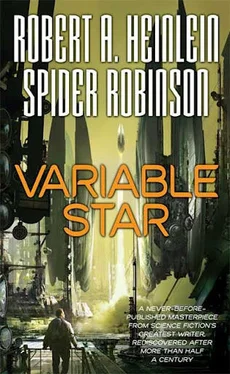Quantum ramjet.
The quantum ramjet relies on the well-established theory of quantum fluctuations in the energy of the vacuum. These occur throughout the universe on extremely small scales of time and distance. Over times on the order of 10 –15second and lengths of about 10 –55centimeter, masses as high as 10 –5grams and energies as large as 10 –6ergs pop in and out of existence interminably. Conventional physics supports this picture, but it is an entirely different matter to make use of vacuum quantum fluctuations to propel a starship. A quantum ramjet, first proposed by H. David Froning (an engineer!) back before the Collapse, would work by “ingesting” the energy of the quantum fluctuations and converting it to propulsive energy. If the quantum starship could tap only a very tiny fraction of the theoretically available mass/energy of the vacuum, it could accelerate rapidly to relativistic velocities. But until Ikimono Roshi tried visualizing something in his mind, as he sat zazen in his ship in the Belt one day, and found himself half a light-year from home before he could stop doing it, no one had a clue how this might be accomplished. It almost certainly never occurred to anyone before then that human attention might be a necessary condition for the phenomenon. It was fortunate indeed that Hoitsu Ikimono was a Roshi—a Zen master, for whom sustained attention was a given—or he might never have made his way back to Sol to spread the news.
The philosophical implications of the quantum ramjet alone are startling. If, as the inflationary theory of cosmology mandates, the universe evolved from a quantum fluctuation that somehow grew to its present enormous scale, the same thing might occur as a matter of course in the heart of the quantum ramjet. Does each quantum ramjet create and destroy countless universes as it travels our cosmos, and are their crews as gods to the countless beings in the universes that support their flight?
The engineers have already left the room to vomit. And I can’t really say I blame them. But who knows? You, maybe?
To an engineer, it’s simple. If you can explain what you’re doing in numbers, and prove them, it’s science. If you can’t, it isn’t. End of story. There is much to recommend this view: it is essentially what keeps the black heart of the Prophet rotting in his stained coffin where it belongs. And any Relativist will happily admit she does not know how she does what she does. Nobody does. It’s not at all certain, in fact, that anybody ever will.
One thing is generally agreed, however: the man who had so far come closest to providing an explanation—who had at least provided some useful mathematical tools for approaching the problem, and pointed out a promising theoretical path through what had been an impenetrable thicket—was a Nobel prize-winning physicist from Ganymede named Ben Johnston.
My late father.
No wonder Kindred was terrified of me. Kindred did not want even the slightest morsel of understanding of the process by which he made himself one of the wealthiest individuals alive to creep into his mind. The thing that most Relativists fear the most is burnout : utter annihilation of personality. Not Kindred. He might even have yearned for it a little. As London had said, he was terrified of the Centipede’s Dilemma. Once the centipede got to pondering just how he managed all those legs, he couldn’t do it anymore. Kindred feared that if he understood what he did, he might stop being able to pull it off. For all he knew, my father might have told me some significant datum before he died, shared some crucial insight that I might be stupid enough to blurt out, whether I understood it myself or not. The risk was tiny, but to him the stakes were everything . So he averted his eyes and fled.
An engineer would call that raw superstition, primitive bullshit, childish magical thinking. But nobody cares what an engineer thinks about this topic, until he can make a big can full of people move at close to lightspeed without carrying any fuel for its primary drive. So of course they’re working on it, and good luck to them.
But I can’t think of any engineers I’d have been as excited to talk with over postprandial coffee as the three Relativists who remained at the table.
Nearly at once, and without warning, I found myself skateboarding right off a conversational precipice.
One minute I was enjoying the ride; the next, I looked down and saw, kilometers below, the rock-strewn base of the cliff I had just left behind me.
Why it took me by surprise, I cannot tell you. I admit it: in retrospect, I look dumb. How smart would I have had to be to guess that one of the very first polite questions to be directed at me would be:
“And what do you do, Joel?”
Now, where did I put that parachute?
It happened to be London who asked. The correct honest answer was: it sheets the bit out of me . I hadn’t even had time—during my walk here from my room—to draw up a master list of my options, arranged by category, much less zero in on anything. What I did these days was mostly get loaded, and mourn my lost love. It seemed to be all I had been doing, for quite a while now.
I kind of did not want to tell three of the most interesting people on the ship that I was that big a fool. But I had no other answer to give them.
Technically I could have said, “I’m a farmer,” without perjuring myself. I had contracted, as part of the price of my ticket, to spend twenty-one hours a week working down on the Sheffield ’s Agricultural Decks, sharing my putatively valuable experience and expertise in hydroponic farming. Somehow I didn’t feel like going with that answer, either.
I am no longer sure, but I think I had decided on an enigmatic smile as my best response, when Sol answered for me. “You’re going to love it. Joel plays the sax.”
“And composes,” Herb amended for me.
I opened my mouth—
“How wonderful,” said Hideo the little monk.
I closed my mouth—
“Saxophone? Oh, I do love it,” London said. “Are you any good, Joel?”
That one, at least, I had numerous stock answers for on tap. I tossed out the first one that came up. “I think so. Being tone deaf, I’ve never been sure.”
“Sol?”
Sol shrugged. “I haven’t heard him play yet.”
“Herb?”
Herb shrugged, too. “Hasn’t played a note in my hearing yet either. Stingy bastard.”
“Nonetheless I am prepared to bet cash he’s very good,” Sol said.
“On what basis?” Hideo asked.
“I’ve examined his instrument closely. It is the saxophone of a man who loves it dearly, and is loved in return.”
I stared at him. “You can tell that?”
He just nodded.
“Well, we simply have to hear you, then,” London said. “Solomon, do you think the management would have any objection if we were to send for Joel’s instrument and ask him to play for us, here? Failing that, we could adjourn to my cabin.”
I took advantage of the discussion that ensued to think, hard and fast. I was on the edge of being committed, to something I had not chosen. Lately.
Playing sax and composing music had been what I did, once. They had been just about all I did, aside from thinking about Jinny. They and she had together constituted what I was, what I wanted, what I was for. Together. It had been a long time since I had thought of a future as a composer without Jinny as part of the picture.
Maybe when all the dust settled, and all the fallout faded to endurable levels again, I would still—or again—want to be a composer/musician. I had to admit, in fact, that it was highly likely. What the hell else was I qualified for? What else did I love nearly so much? (Don’t answer that one.)
Читать дальше










